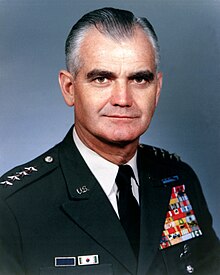
Back William Westmoreland AN وليام ويستمورلاند Arabic Vilyam Çayldz Vestmorlend Azerbaijani ویلیام وستمورلند AZB William Westmoreland BAR Уільям Уэстморленд Byelorussian William Childs Westmoreland Catalan William Westmoreland Czech William Westmoreland Welsh William Westmoreland Danish
William Westmoreland | |
|---|---|
 Westmoreland in 1969 | |
| Nickname(s) | "Westy" |
| Born | 26 March 1914 Saxon, South Carolina, U.S. |
| Died | 18 July 2005 (aged 91) Charleston, South Carolina, U.S. |
| Buried | |
| Allegiance | United States |
| Service | |
| Years of service | 1936–1972 |
| Rank | General |
| Service number | 0-20223 |
| Commands | Chief of Staff of the United States Army Military Assistance Command, Vietnam XVIII Airborne Corps 101st Airborne Division 187th Regimental Combat Team 504th Parachute Infantry Regiment 34th Field Artillery Battalion United States Military Academy |
| Battles / wars | |
| Awards | Army Distinguished Service Medal (4) Legion of Merit (3) Bronze Star Medal Eulji Order of Military Merit Taegeuk Order of Military Merit |
| Signature | |
William Childs Westmoreland (26 March 1914 – 18 July 2005) was a United States Army general, most notably the commander of United States forces during the Vietnam War from 1964 to 1968. He served as Chief of Staff of the United States Army from 1968 to 1972.
Westmoreland adopted a strategy of attrition against the Viet Cong and the North Vietnamese Army, attempting to drain them of manpower and supplies. He also made use of the United States' edge in artillery and air power, both in tactical confrontations and in relentless strategic bombing of North Vietnam. Nevertheless, public support for the war eventually diminished, especially after the Battle of Khe Sanh and the Tet Offensive in 1968. By the time he was reassigned as Army Chief of Staff, United States military forces in Vietnam had reached a peak of 535,000 personnel.
Westmoreland's strategy was ultimately politically and militarily unsuccessful. Growing United States casualties and the draft undermined United States support for the war, while large-scale casualties among non-combatants weakened South Vietnamese support.